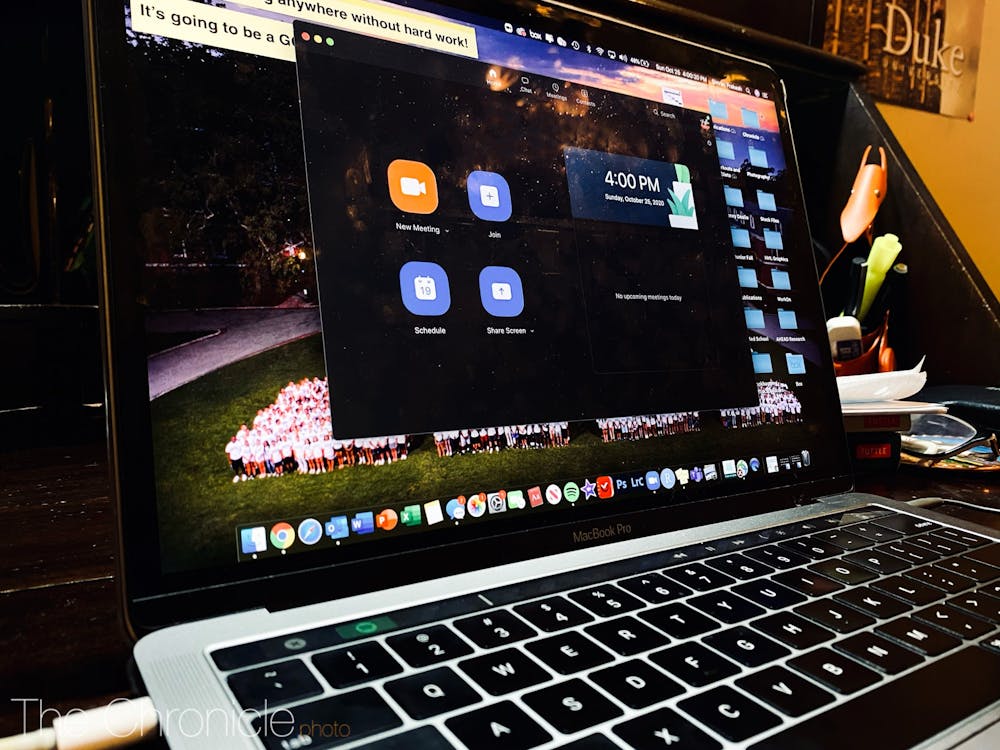When bookbagging opened for the fall 2021 semester on DukeHub, members of the Class of 2024 discovered a detail underneath their courses that many had never seen before: building names and classroom numbers.
The majority of classes in both the fall 2020 and spring 2021 semesters were online, with some courses using a hybrid format while a select few were fully in-person. But on April 16, Duke announced that the University intended to return to in-person classes with normal classroom density in the fall.
According to the Keep Learning website, “Duke welcomes all students for in-person teaching in the fall” and “[expects] that in-person will be the dominant form of teaching.” However, for students who do not feel comfortable returning to campus, some classes will be offered fully online.
The amount of online courses offered on DukeHub is minimal. Some courses have online lecture components but still require in-person discussion time, while others are completely virtual.
The list of courses with online lecture components includes Introduction to African American Studies, Introduction to Policy Analysis, History of Documentary Film, Elementary Turkish and Swahili, Classical Guitar and other independent studies.
Certain courses like First-Year Chinese I are online out of necessity. Lu Liu, instructor of Chinese language at Duke Kunshan University, is teaching a section of First-Year Chinese I alongside Minnange Qin, lecturer of Chinese language at DKU.
Because DKU is located in Jiangsu, China and both Liu and Qin are Chinese teachers, most of their students are international students, Liu wrote.
“[The students] cannot come back to campus due to the travel and visa restrictions, so we will use the online format for our classes in the upcoming fall semester,” Liu wrote.
Other courses will remain online to accommodate certain students’ learning styles. While many students are eager to get back in the classroom, some students benefit from the flexibility in movement and accessibility that online courses offer, such as students with medical needs who might not be able to attend a face-to-face class, according to Rebecca Ewing, lecturing fellow of romance studies.
Ewing is teaching an online section of Advanced Intermediate Spanish 204 in addition to an in-person section.
Last spring, Ewing applied for a grant through Duke Learning Innovation’s Carry the Innovation Forward program and is using the funds to learn more about Universal Design for Learning, a model for making teaching and learning more accessible for all students.
“The section of Spanish 204 that I will be teaching in the fall online will be designed to maximize the use of UDL principles and offer flexibility for students who, for a myriad of reasons, may prefer learning online to going to class in person,” Ewing wrote.
Research published by the American Institutes for Research suggests that some students learn best in face-to-face instruction while others benefit more from instruction in an online course. Matching the course's format to the students' learning preferences ensures higher learning outcomes, according to Ewing.
This summer, Ewing attended a virtual conference where Regan A. R. Gurung, professor and director of the General Psychology Program at Oregon State University, presented his findings on the outcomes of learners who preferred in-person or virtual classes versus the format of class they took.
Gurung’s research found that the degree to which the class format aligned with students’ preferences played a key role in students’ success in the class. Students who wanted an in-person class but got an online one had lower grades than students who were impartial or positive about online class and were assigned to an online class. The key was to match students with the kind of class format that they wanted.
Self-efficacy—students’ expectations about how well they would do—also played a role: higher self-efficacy correlated with higher grades.
“In general, online learning has been shown to be as good as and in some cases better than face-to-face,” Gurung wrote in an email to the Chronicle.
It is still unclear how much interest there is in online instruction, especially since most students seem excited to get back to face-to-face communication, Ewing wrote. However, a small number of students have already signed up for her online class.
“I am excited to teach both in-person and online in the fall and see how my students respond to both learning formats,” Ewing wrote.
Get The Chronicle straight to your inbox
Signup for our weekly newsletter. Cancel at any time.
Alison Korn is a Pratt junior and enterprise editor of The Chronicle's 118th volume.

